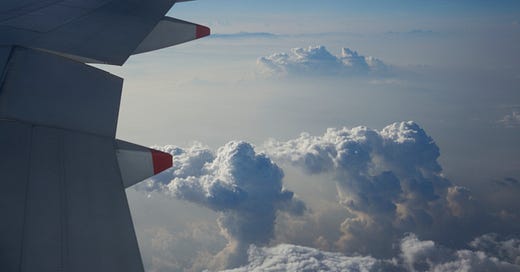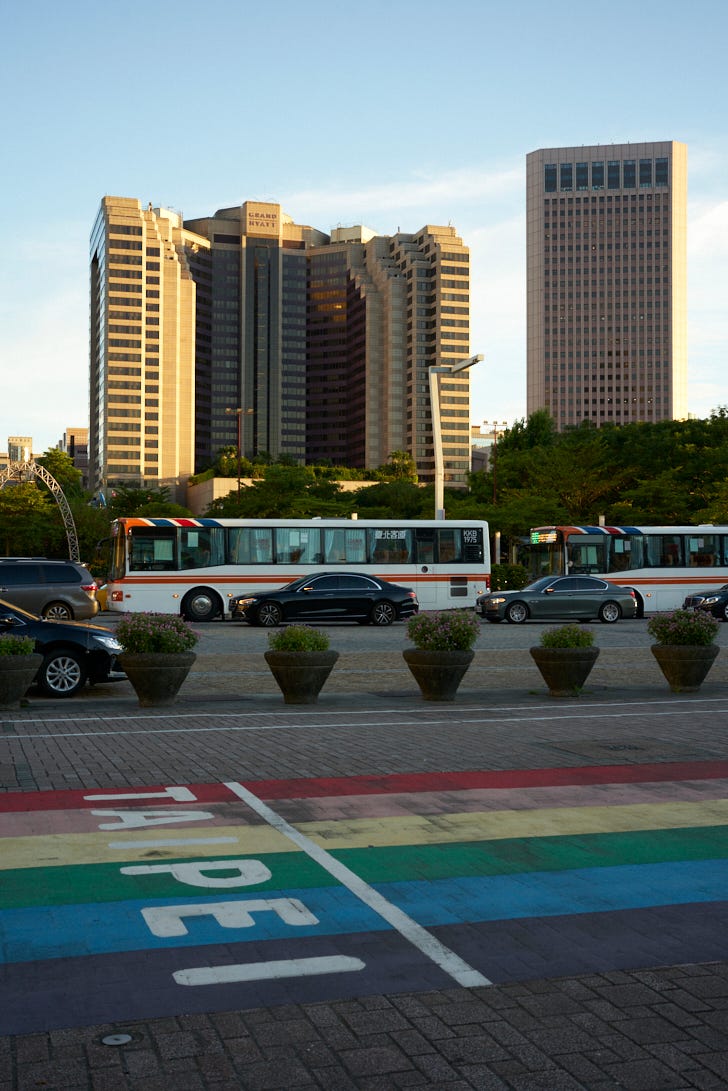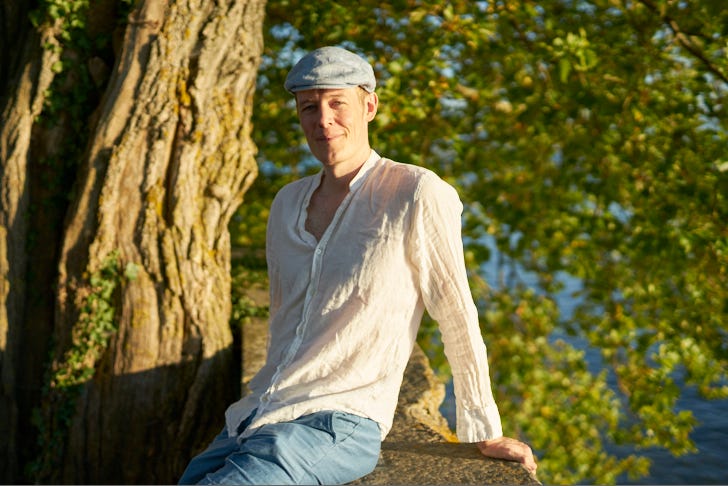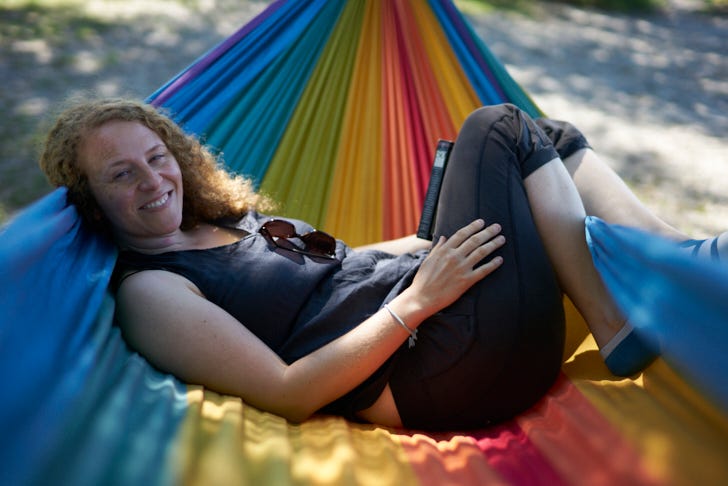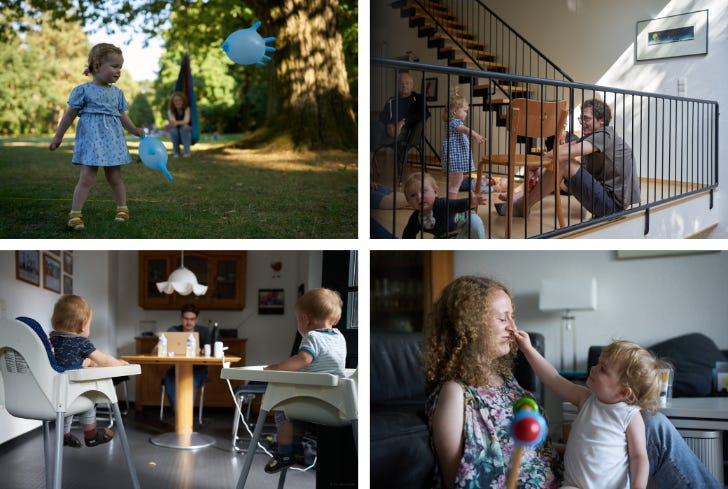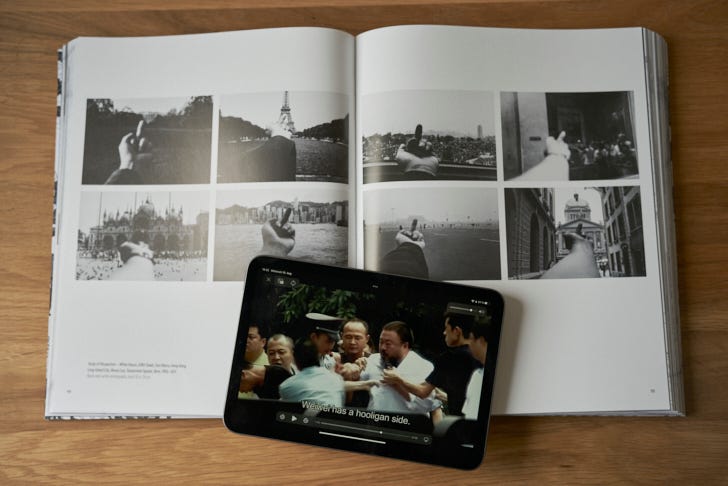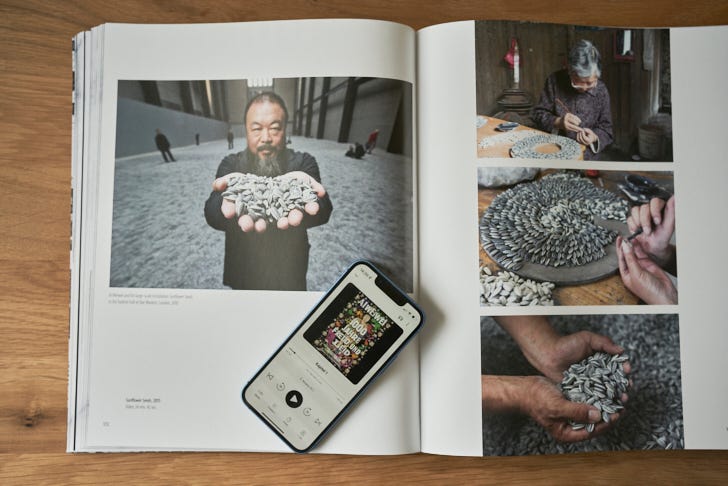This is the late-summer edition of benerkenswert. A warm hello to everyone new here!
Find the issue in all its glory on my website. Click here for an automated (and hence rather inauthentic) German translation provided by Google.
Anna and I are back from our yearly vacation in Europe and enjoyed some beautiful days with our families and friends. During vacation, my desire to write was unfortunately not matched by my determination to actually sit down to do so, so there was no August issue. Sorry. Turns out bemerkenswert takes “Sommerferien” as well!
The Days of Nancy
Taiwan had its week of fame at the beginning of August after Nancy Pelosi, speaker of the United States House of Representatives, visited the country and Chinese warships later looked like they would like to do so as well. Quickly, Taiwan made headlines all over the world. Yet, the media storm must have been a hurricane (or typhoon, we are in Asia, after all!), as there was a weird eye of calm here over the island itself, where life went on mostly as usual.
While the day of Pelosi’s visit had an air of momentousness, the habits of daily life remained consciously (and maybe a bit comically) undisturbed: a cab driver we talked to wasn’t aware that she is here; Taiwanese social media was most concerned with what “Nancy“ was about to eat, prompting Taiwan’s president Tweet Tsai Ing-Wen to post an ice-cream cone as one of her official four twitter photos of the visit; only few onlookers awaited her limousine at the Hyatt she stayed in. All in all, nothing in Taipei reminded of an event that some Chinese pundits claimed (in another ridiculous hyperbole) to be “to the Chinese people what the Pearl Harbor attack was to the Americans during World War II“. And yet, the drum roll of international press-coverage, speculations, and saber rattling was raising in volume by the hour.
The next day, I felt a weird mix of excitement and stress to be in Taipei. While Anna was blocking her days to give several interviews to European radio and TV stations, I tried to ignore the news and keep my focus on work, yet of course spent hour-long “coffee breaks” to debate the issues with friends in the local NGO and policy circles. Rumor and speculations had it early that Pelosi was likely to come, a Chinese reaction would be considerable, relationships would be stretched further (well, it might still never again be as good as now?), and a real Cross-Strait-Crisis was possible but not certain. Indeed, the CCP announced “joint military operations“ quickly after she left, conducting six exercises around the island (mirroring a potential blockade of the island), violating the median line traditionally respected by both Taiwan and China just as Taiwan’s territorial sea and ADIZ, shooting rockets over the island even reaching into Japan’s exclusive economic zone. Still, as so often China’s representatives and media loudly declared China to be the one bullied, provoked, and humiliated – a message unfortunately parroted too often by western media with unreflected naïveté. While – luckily! – weaponized conflict was deemed by most unlikely, we were still nervous. You never know! A misguided rocket; a ship too close to shore; an “exercise maneuver” turning real; a spy launching a Taiwanese missile as a precedent; a completely overblown Chinese threat or ultimatum – we were not shy of ideas about what could go wrong in the most unlikely of cases and hence very happy when the tension dropped off a bit and the PLA (People’s Liberation Army, the CCP’s and thus China’s military) ended their “exercises” to head back home.
Back in Europe, I had many conversations about Pelosi‘s visit, the media narratives around it, the eventuality and risk of a military invasion, Xi and the party, actual and actually-not parallels between Ukraine and Taiwan, China’s economic and cultural decoupling from The West, and the consequences of the conflict for it and especially Germany. I also had a strong desire to share these ideas, yet unfortunately lacked the determination during my holidays to polish my notes, sprawling, chaotic, and mostly better-told-elsewhere as they were. That would have been the August issue, I guess…
The Taiwanese Perspective
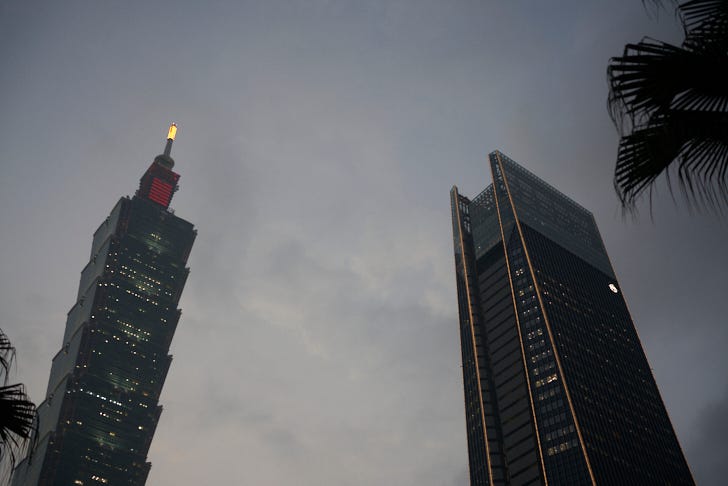
While Spiegel, FAZ, ZEIT, Tagesschau, Economist, Guardian, NYT et al. were catching-up with what was happening (and everything else that had happened in the last months), one part of the story was definitely missing: The Taiwanese perspective. As so often with crises like this, the overall debate felt weirdly disembodied, confusing realpolitik with indifference, objectivity with both-siderism (being not shy of emotionalizing China’s reaction and blaming the US for everything), framing risks in numbers like sea miles to be crossed, casualty estimates, and percentage loss in German GDP (“2-3 times as bad as the war in Ukraine”, if I remember correctly). Sleeping on the island over which the rockets flew, I realized how cold and heartless these information and attention games felt, and I can only imagine how it was for those who give birth to their children and bury their ancestors here, would not be among the first few thousands to be evacuated, do not have a home to get back to, and whose savings are invested to not a small degree in a currency that would be obliterated.
I am not able to follow the local press in Chinese, so even my inside-view is limited at best. The positive framing of this is that even with English-language news and Twitter it is possible to get a rough feel for the temperaments here, even when it of course doesn’t make up for our English conversations and felt experience of walking in these streets. Still, local and international news as well as social and independent media offer insights into people’s lives far beyond the common snippets shared in the German “Brennpunkt” at 20:15 after the main news. Let me highlight two articles – written by Taiwanese – that bring some this perspective across.
The first is a CNN-opinion piece by Clarissa Wei (she is also a very worthy follow on Taiwan-Twitter):
“There’s a jolting disconnect between how the outside world perceives Taiwan (as a potential flashpoint for world war), and how we in Taiwan see Taiwan (our dear home where we live). And part of that disconnect is because the international conversation about Taiwan is filtered through a geopolitical lens and almost always in the context of China.”
“As a fellow Taiwanese friend put it, the Chinese threat is like a cancer in remission that continuously threatens to come back. We’ve been infected with it for decades and are acutely aware that it very well might kill us this time around. However, these are long-standing issues the Taiwanese people have been raising for years — more often than not to deaf ears.”
The second is a more personal essay by Albert Wu & Michelle Kuo, a Taiwanese-American couple of grassroots journalists in Taipei. They published their piece maybe a bit too timely, flavoring it with some spicy takes on the greater context:
“For our part, we think the relative silence about Pelosi’s visit is an expression of contempt, a condemnation of the silly game these Great Powers are playing. China’s thin skin at the prospect of anyone of international repute visiting Taiwan, or of the Taiwanese making something of themselves on the global stage, is laughable. But equally ridiculous is Pelosi’s and Biden’s song and dance. What does Pelosi intend to achieve with this trip, anyway? She’ll come and give a couple of speeches, wine and dine some fancy people, visit a few high-tech factories, and that’s supposed to … do what besides annoy China?”
“You know what would really excite people here? Politicians who can envision a radical restructuring of global geopolitics and commit to Taiwan’s place therein.”
Oh, Germany
Since our last visit at the beginning of the year – ending shortly after Russia invaded Ukraine – most of my connection with Europe took the form of a trickle of messages in various family chats and occasional video calls, voice mails with friends, and the (online) news. My perspective is thus skewed towards the very private and the very public, with highlights of the former and low points of the latter taking over most of the weight on my attention. Thus, as I was joyous to meet family and friends again, I was also wary of the vibes in the streets, my impression tainted by spinning political debates and a cacophony of voices shouting into the void of social media. Indeed, once there, Germany felt more alive but also cruder than Taiwan. On a very general, aesthetic level, Taiwan’s collectivism – shifting between respect and rigidity – was replaced by a stronger individuality, encompassing creativeness as well as entitlement. German Passersby – it seemed to me – had a self-assured presence or sometimes absent-minded scuffle in their general gait and demeanor, very different from the calm, often elegant, maybe a bit aloof bustling typical for Taipei’s central districts. Germany’s dirty public spaces, ever-delayed and often-canceled trains, and grumpy service staff additionally created a subconscious impression of individual carelessness and missing care for each other.
Luckily, only my experiences with Deutsche Bahn grew into actual frustration (one failed connection and communication blunder at a time). The European summer and Sommerlust quickly made up for everything else. Oh how I loved the lush days, cute and lively town centers, long warm evenings, carefree hours with friends and family! I appreciate how living on another continent teaches me a fresh perspective; I even more cherish how it makes me aware of all the small wonderful things I used to take for granted. Muesli with sweet peaches for breakfast, swimming in a lake, a selection of cheeses, a light breeze, visiting the farmers’ market with our parents, taking my niece to her Kita, the golden hour, a night out with friends, ending the day on my brother’s terrace.
Cherished Moments
One great part of seeing friends and especially family was the opportunity to take lots of photos without being weird. Especially my nephews and niece were great models in their childish ignorance, quickly losing interest in the camera.
As I wrote elsewhere with more words: I love photography as a meditative practice, as a way to witness a moment more consciously as it unfolds. With small children, scenes change slowly yet there is always something happening. Thus, I had lots of time to play with different perspectives, backgrounds, focal planes, apertures, often cowering in one corner of the room, waiting for the perfect cagey smile. And while I tell myself that the purpose of the hunt was to gift my siblings beautiful pictures of their loved ones, I cannot deny a certain self-interest… and pride. Yet, when I am honest I owe most of the beauty of the photos to my models, patience, a ruthless selection, my wife’s tolerance of my photography-related consumption, and most of all my father’s example. The hundreds of pictures he took of the four of us made him one of the best child photographers I know, and I am grateful he shared his most important secret. Buckle up if you want to double your photography-game for your children! All you have to do is… crawl. Go down, lie on the floor, make an idiot of yourself, just make sure that you take their perspective. Is it surprising that cute little devils look better when you don’t look down on them?
Recommendations
Documentary: Alison Klayman, Ai Weiwei: Never Sorry (★★★★★)
Never Sorry is a 2012-documentary by the American directress Alison Klayman, awarded with a special jury prize at the 2012 Sundance Film Festival. It accompanies Ai from 2008, when he worked in his studio “258 Fake” in Beijing, until 2011, after his arrest and detention and before he left China for Berlin. It is an intimate documentary, portraying one of China’s most well-known artists (and persons?), a patriotic critic of the government, bridging art and activist citizenship. “Weiwei has a hooligan side”, a companion of him is quoted in the movie. He himself agrees, arguing that it needs a hooligan to stand up against hooligans.
Klayman artfully threads the question what it means for Ai to be an artist, for us to see Ai as an artist through the documentary, channeling his courage, wisdom, and complexity. A remarkable documentary! Please take the time to head over to the full review, as it would fall out of proportion here.
Book: Ai Weiwei (艾未未), 1000 Years of Joys and Sorrows (★★★★☆)
Ai’s book contextualizes the crucial years in the center of Klayman’s documentary through his and his family’s broader biography, naturally adding many fascinating first-person accounts. Definitely worth the read!
Music: Macklemore, Gemini (★★★★★)
While I very much enjoyed the new albums of two of my study-time favorites, Silversun Pickup’s Physical Thrills and Muse’s Will of the People (mostly for nostalgic reasons, Links to Spotify), it was Macklemore’s 2017 album GEMINI that earned its place here. Great variety, great beats, great instrumentation – great stuff! (Oh dear, you can tell I am a true music critic!) Let’s see: I loved the dirty-brass-farts alongside the noticeable line “I woke up like bitch I’m Willy Wonka” (in Willy Wonka) and how it contrasts to the flute solo in… How to Play the Flute; the joyful gallop of Glorious, basslines of Levitate, guitars riffs and rock galore (“born under a blood moOn, but the sun is coming up soon”) of Firebreather. Intentions is a perfect song for your metta-meditation after a rainy goblin-weekend spent at home; (And by you I mean not me, of course!) Over it a masterful symphonic “neither with nor without each other”-relationship-hymn in the moody style of Kanye West’s Love Lockdown (“now I’m freE!”). Also: violins!
Many years in symphonic classical music have left their marks, my mind usually doesn’t compute the lyrics of songs any more unless I focus fully on them. (Which is hard, as my mind also loves to get lost in trains of thought.) GEMINI was no difference and I missed most of the lyrics most of the time except a few shreds here and there (“…I’m Willy Wonka töt-tööt-tööt-töt-tööt!”) even after listening to it back to back a few times. But during a somewhat rough patch in the middle of my vacations (health stuff… it’s all good again!), I really appreciated the contemplative qualities in some of the songs. I mentioned the somewhat frolicking Intentions earlier, but it was Gemini’s last piece, Excavate that really moved me. The genre of “men reflecting on their life in the middle of it, honest, vulnerable and mature” is a difficult one, as I am neither fan of public vivisections nor naïve tales of hustle-glory. (Both perfectly united in masterworks of the “I want to thank the whole German #innovation-community here on LinkedIn for making my success possible!”-kind!) Excavate proves once again that the genre is actually a musical one; a deep, personal, touching meditation on life, a warm blanket of sound and meaning for the middle of the night.
Links
Article: Clarissa Wei on Food in Taiwan: “Much in the same way that American Chinese food is completely different from the food actually served in China, pizza in Asia is oftentimes unrecognizable from the margheritas, Sicilians, and dollar slices of the world.” Pizza in Taiwan is oftentimes expensive and crazy. What I didn’t understand for a long time: the craziness doesn’t speak for a desire to provoke (even though it doesn’t mind). Rather, it takes its inspiration from local culture, and especially night markets. (tastecooking.com)
Twitter Thread, Case-in-point 1: @lnachman32 on the “mythical” Boba Pizza (Twitter)
Twitter Thread, Case-in-point 2: @rzhongnotes on Oreo-Spicy fried chicken-tempura-squid ring-pizza (! – also Twitter)
Article: We talked about Taiwan, Nancy Pelosi, and Food – of course there is more to all of it! The chaos around Pelosi’s visit was of course not without its oddities. We had some fun with a weird story emerging on Chinese social media, where people tried to “prove” that Taiwan is part of China due to the many Chinese restaurants here… (vice.com)
Video-Clips (🇩🇪): I think it’s funny how social media is totally agnostic on “what it is”. Is Twitter a micro-blogging platform, a chat room, a notification infrastructure, a social graph? (Or maybe “a time-saving expression for a collection of financial interests” – to quote Logan Roy with a nod to Matt Levine?) Neither? All of it? YouTube? Teleshopping, lecture hall, everything-school, …, a public archive for videos? – The older of my brothers is music teacher, and he told me about the amazing channel of Marti Fischer. Fischer is… something something musician, comedian, composer, YouTuber, … – these new careers, you know what I mean. Before reading his Wikipedia entry, I actually liked the idea of him being a music teacher, it gives his (willfully goofy, aggressively cut) style an innocent spin. Der Sound von… is his knowledgeable, silly, entertaining, and very unique analysis of the music style of various bands, taking the form of advice for music creators, thus adding a nice technical level as well. Pick your poison: Red Hot Chili Peppers (with English subtitles), Depeche Mode, Modern Talking, or – of course – Rammstein!
Please subscribe here if you want to get the next issue directly into your inbox!

